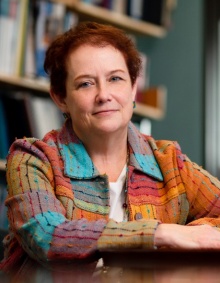Dean's Column
From Dean Nancy J. Smyth

Over the years, I've observed the career paths of many alumni. Some stay within traditional social work jobs, and some go outside of the profession’s traditional domains. Often alumni working outside the profession apologize; when they do, I ask if they feel they are still using their social work skills, values and perspective. They always answer “yes.” These “alternative path” alumni have a gift to offer all of us. They help all social workers understand what we bring to any context; many social workers are unable to fully articulate all that we bring to our work, and, end up undervaluing ourselves and our work.
We have skills in understanding people, complex systems and complex problems, and the interconnections between people and their environments—those elements are prevalent everywhere, not just in human service settings. We know the importance of diversity; how to facilitate dialogue and collaboration among people from different backgrounds. And our core values, such as social justice, the dignity and worth of individuals, integrity, competence and the centrality of human relationships are all elements that our society desperately needs. As social workers, we bring those perspectives and skills to whatever we do.
Just imagine, for example, if Exxon had employed a social worker in a key work oversight role that focused on the company's management, supervision and safety practices. Might such an influence have avoided the human-caused environmental disaster that occurred with the Exxon Valdez?
I'm excited about this issue’s article featuring alumni applying their social work values in different careers. I hope it can be the start of a continuing dialogue and, in the long run, help us all to do a better job of identifying our skills and better articulate them to potential employers.
I’m also excited about our new online part-time Doctor of Social Work (DSW) in Social Welfare Program. (Please visit socialwork.buffalo.edu/dsw for more information.) We're focusing on experienced practitioners who want to take their knowledge and expertise to a higher level, to transform their real-world practice. This is called implementation science, that is, how to successfully translate new interventions into organizations and community systems.
We’re pleased to be able to offer professional social workers the chance to further their knowledge base and capabilities with a practice-based doctoral program—encouraging them to further establish themselves as practice thought leaders.
Nancy J. Smyth, PhD, LCSW